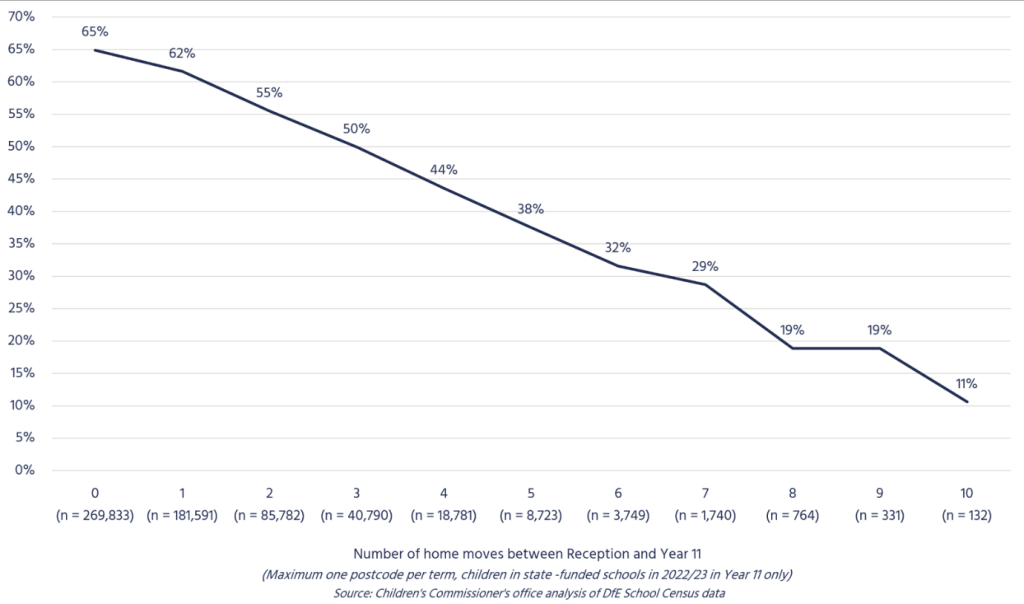- Children waiting years for mouldy, infested or unsafe homes – as new analysis shows relationship between frequent home moves and GCSE performance
- Just 11% of children who moved home 10 times while at school achieved five GCSEs, including English and maths, compared to 65% of children who had one home address
- Stark example of why children’s experiences must be reflected when designing solutions to society’s biggest challenges
- Commissioner warns children are being ignored but paying biggest price, as she prepares to host her inaugural Festival of Childhood – bringing their voices directly to decision makers
New evidence from the Children’s Commissioner has revealed for the first time the stark relationship between frequent home moves and children’s GCSE results.
Just 11% of children who move home more than 10 times during their time at school achieve five GCSE passes, including in English and maths – compared to 65% of those who never move house between Reception and Year 11.
Thousands of children in England face housing instability while at school, with more than 75,000 children – 12% of all Year 11 children – having moved at least three times over their time at school.
The new analysis from Dame Rachel de Souza comes as she prepared to host her inaugural Festival of Childhood, a platform for bringing young people together with politicians and decision makers to discuss the most important issues in their lives and shine a light on why having their voices reflected in policy making is so urgent.
Children’s Commissioner Dame Rachel de Souza said:
“Housing instability is a striking example of why the ways children experience the world must be reflected in solutions. For too often, their views are excluded from conversations about issues impacting their lives because as a society we have forgotten how precious and short childhood is.
“To put it bluntly, children are paying the price of growing up in poverty – they are more likely than adults to live in cold, damp or overcrowded homes. I want decision makers to talk more about what it feels like for a child to be in temporary housing: that might mean having to share a bathroom with strangers, not feeling safe to go outside alone, having no space to study or play, or living miles out of town without access to public transport.
“Children have told me about homes that are in disrepair, damp, dirty, sometimes with no running water or toilet – in 2025 that’s shameful. Some find it hard to concentrate at school because of unfit housing, while others are forced to move school in the middle of the year – so it’s no surprised their education is paying the price of this disruption.”
Today’s new analysis looks at Department for Education data on pupil postcode changes and GCSE exam results to determine that pupils in Year 11 (in 2022/23) with just one home address between Reception and Year 11 were those most likely to get five GCSEs passes, including English and maths – with 65% of pupils achieving this.
Proportion of children who passed 5 or more GCSEs, including English and maths, in Year 11 by the number of home moves across their school career

The more house moves a child made during their school life, the less likely they were to achieve at GCSE: just half (50%) of those with three home moves achieved five GCSEs, including English and maths, and just over one in 10 (11%) of those who moved home 10 times.
The analysis was shared exclusively with Sky News and housing campaigner Kwajo Tweneboa for their investigation on the rising numbers of homeless families living in – and waiting long periods of time for – temporary accommodation.
Dame Rachel de Souza recently visited Surrey Square Primary School in Southwark, where 25% of pupils live in temporary accommodation, to speak to pupils about their experiences. The children spoke to her about living with rats, overcrowded rooms without a bed to sleep in and a lack of basic amenities. Many described feeling ashamed and unable to invite friends over.
Dame Rachel de Souza said:
“Last year my Big Ambition survey found just one in five children thought leaders listened to what they had to say – but their views and experiences must be listened to if we are to protect childhood and support every child to live safe, happy, successful lives.
“That’s why I am bringing their voices directly to decision makers from all across society at my inaugural Festival of Childhood with a clear mission: to make England the best place for children to grow up.”
The Festival of Childhood, hosted at Young V&A on April 3, will mark the beginning of Dame Rachel’s penultimate year as Commissioner, where she will set out her vision for positively shaping childhood.
Young delegates will join a diverse audience of adult decision makers – politicians, educationalists, voluntary-sector leaders and academics – to discuss the most pressing issues in their lives, representing organisations such as the Scouts, London Wildlife Trust, the Duke of Edinburgh Award, as well as the Commissioner’s own Youth Ambassadors.
Over the last four years, Dame Rachel has heard from a million children and young people about their experiences of growing up in England: from unfit housing, the need for greater educational support in school, delays with accessing timely healthcare, safety in their communities and feeling adequately prepared for adult life.
About today’s analysis:
The Children’s Commissioner’s analysis uses data from the Department for Education’s (DfE) School Census, which collects pupil-level data from state-funded schools, nurseries and alternative provisions once in each of the Autumn, Spring and Summer school terms. As part of the School Census, schools report to DfE the home postcode of every child on their roll. The office identified 612,352 pupils who were in Year 11 the Summer term of academic year 2022/23 and looked at the number of unique home postcodes recorded against them between Spring 2011/12 – when the majority were in Reception – and Summer 2022/23. Autumn 2011/12 was excluded due to a large number of missing records for this cohort in that term, possibly because many hadn’t yet started compulsory schooling.
This analysis will not capture every home move a child had. Because the data is only captured once per term, the data will not detect two home moves if they occurred in the same term. And, because the analysis looks at postcodes only, rather than the full address, home moves which stay within a postcode area will not be detected by the analysis.
Some children had experienced more than 10 home moves between Reception and Year 11 but were excluded from the analysis as their sample size was insufficient.
This data was joined onto the final version of DfE’s pupil-level GCSE data and used DfE’s derived variable for whether a pupil had passed 5 GCSEs, including English and maths.





